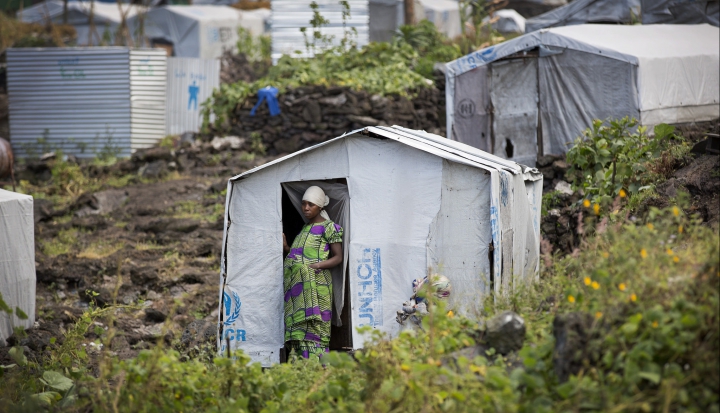Lampedusa is a speck of land in the southern Mediterranean, less than eight square miles in size and with a population of around 6,000. It belongs to Italy but lies much closer to North Africa. Over the past 20 years, it is estimated that around 400,000 migrants making their way by sea to the European mainland have landed on Lampedusa. At least 15,000 have died on the way.
One incident, in October 2013, attracted international attention: A boat overloaded with migrants sank within sight of the island. More than 360 men, women, and children drowned. It turned out later that many of those onboard had been victims of extreme exploitation, subject to torture and extortion by criminal gangs who prey on migrants desperate to escape poverty, violence, and political oppression.
This tragedy was all the more poignant because, just a few months earlier, Pope Francis had chosen Lampedusa as the site of his first pastoral visit outside of Rome. He celebrated Mass at a makeshift migrant shelter, using a chalice and lectern fashioned out of wood salvaged from flimsy boats shipwrecked on Lampedusa’s coast.
The Holy Father’s homily was simple and direct. He prayed for the forgiveness of those “who are complacent and closed amid comforts which have deadened their hearts.” He spoke of the moral culpability of individual officials who make decisions that impact migrants’ lives and deaths. Most memorably, he called out “the globalization of indifference,” lamenting that “we have become used to the suffering of others: it doesn’t affect me; it doesn’t concern me; it’s none of my business!”
Five years on, the Holy Father’s message is as relevant as ever—and perhaps even more urgent. While migration has always exacted a heavy toll on individuals, communities, and nations, there has been a sharp and recent increase in both the scale of movement and the suffering that migrants are being compelled to endure.
Today more people are living outside their country of birth than at any other time in human history. The number of refugees and internally displaced is edging up towards the unimaginable figures that were recorded after the last world war.
International migration is becoming increasingly expensive and hazardous. Countries that migrants most aspire to because of the promise of freedom, safety, and opportunity are making entry—both legal and irregular—harder than ever. This forces migrants, including refugees who have a legal right to seek asylum, into the arms of those who are able to help them circumvent ever-increasing controls.
Migrant smuggling, the business of moving people across borders for profit, is reported to be one of the fastest-growing and most lucrative forms of organized criminal activity, often involving severe exploitation. For example, the overland routes from Central America and Mexico to the United States expose migrants to “disproportionate levels of risk of human rights violations, disappearance, and death.” Organized criminal gangs extort fees from their “human cargo” for safe passage through Mexico and across the U.S. border, sometimes also forcing them to carry narcotics. Those who cannot pay are frequently injured or killed.
Countries have reacted to the challenge of migration in very different ways. Some, often neighboring states that can least afford it, have done more than could reasonably be seen as their fair share. For example, in just over a year Bangladesh has absorbed almost a million distressed and highly vulnerable refugees fleeing sectarian violence in Myanmar. At one point, refugees from Syria made up around 10 percent of Jordan’s population. In Lebanon that figure is, incredibly, three times higher. The international community owes a great debt to those who have opened their borders, and their hearts, in such a way.
Elsewhere things have been different. Within Europe migration has become a highly contentious political issue, threatening, in a very real sense, the broader European project of political, economic, and social union.
In my own country, Australia, geography has kept the number of “unauthorized arrivals” comparatively low. But the reaction to those who make it across the vast, hostile ocean has been consistently fierce and, many would argue, largely indifferent to human suffering. Long after legal and regulatory changes all but halted irregular maritime arrivals, migrants who have languished for years on remote islands are still awaiting resettlement.
In the United States, a long-standing, complex situation on the Southern border appears to be worsening: Few will quickly forget the recent images of children being wrenched from their parents or of distressed migrants in cages awaiting deportation.
One thing is clear: Migration is not going to go away. History teaches us that the urge to move in an effort to better one’s life is an essential part of the human condition. And economics teaches us that our global economy would grind to a shuddering halt without migrant workers.
But accepting the inevitability of migration does not mean that we should also accept the inevitability of hardship and suffering that Pope Francis has so eloquently railed against.
Current migration regimes, in all parts of the world, are deeply unfair. They put individuals, families, and communities at great risk. They disempower—and too often criminalize—migrants; they rob workers and reward exploitation; they deprive millions of women, men, and children of the most basic rights, including the right to be recognized as a person before the law and the right not to be discriminated against. And, as the Holy Father has pointed out, they have encouraged the malign growth of an indifference to human suffering, a “deadening” of our collective human heart.
How can we embrace the Holy Father’s message to confront and reject the globalization of indifference? Perhaps the most important step we can all take is to gaze outward instead of inward. To be open to learning about what is happening: not just in relation to the migrants, but also the bigger picture about why people are moving, who is benefiting, and who is losing out.
We can also look to the church’s teachings in deciding, as individuals and as communities, how to think and how to respond. For example, the sanctity of the family is not an abstract principle. According to Pope Francis, “The family is a good which society cannot do without, and it ought to be protected.” In other words, family is a core Christian value that helps us determine what we consider right and wrong in the conduct of those who act on our behalf.
Ultimately, the true antidote to indifference lies in solidarity and the recognition that “none [should] have to feel that there is no room for them on this earth.” We must fix our eyes on a future that is achievable in our lifetime: a future where peace and justice, love and compassion overcome our indifference, fears, and divisions. A future where we recognize each other as brothers and sisters, united in one human family.
Image: Flickr cc via United Nations Photo














Add comment